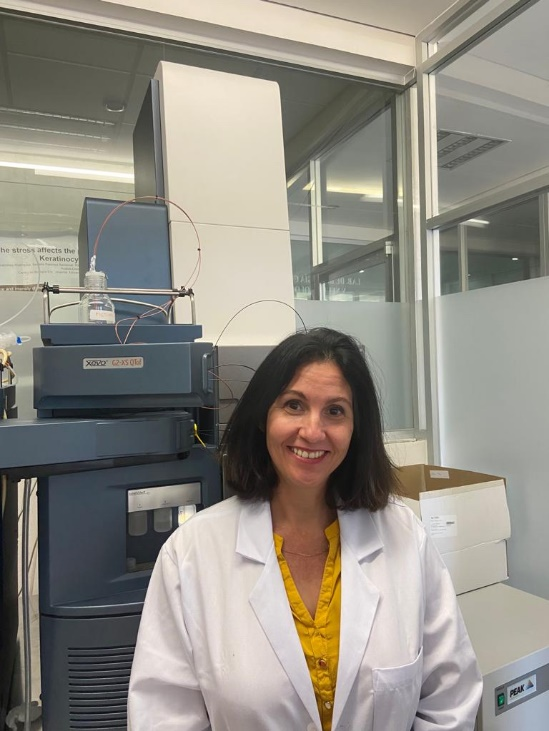Plenary Speakers
Dr. Philip Britz-McKibbin
Dr. Britz-McKibbin received his PhD from the University of British Columbia prior to joining the
Department of Chemistry and Chemical Biology at McMaster University in 2003, where is now a
Professor and currently a Cystic Fibrosis Canada Researcher. Dr. Britz-McKibbin has contributed
to innovations in capillary electrophoresis and mass spectrometry for metabolomics as applied to
preventative health. His research program includes the development of higher throughput methods
for identifying and quantifying metabolites of clinical significance in human biological
samples, including the introduction of multiplexed separations and accelerated data workflows
for biomarker discovery. His research has been funded by NSERC, CFI, CIHR, Cystic Fibrosis
Foundation of Canada, the Ontario Genomics Institute, and the Ontario Ministry of Labour. He has
presented over 100 invited talks and published more than 70 peer-reviewed articles, including 6
invited reviews, 5 book chapters, 2 technical reports and 3 filed patents. Dr. Britz-McKibbin is
the recipient of several prestigious awards for his important contributions to separation
science, MS and metabolomics, including the American Chemical Society – Young Investigator Award
in Separation Science (2010), Japan Society for Promotion of Science (2009), Petro-Canada Young
Investigator Award (2007) and Premier’s Research Excellence Award (2004-2010). He is currently
co-chair in analytical/physical chemistry in the NSERC Discovery Grant Evaluation Committee, a
founding member of the North American Chapter of the Metabolomics Society, and a Section Editor
in Chemical Biology for the journal Scientific Reports (Nature). He has also served as a
scientific advisory board member on several metabolomics initiatives across North America. Dr.
Britz-McKibbin’s research program strives to bridges the major gap existing between basic
scientific research and large-scale epidemiological studies for population health, including
expanding newborn screening programs.
Abstract
Tobacco use and suboptimal diet remain leading preventable causes of death and chronic disease burden globally. Epidemiologists currently rely on standardized questionnaires to assess the roles of tobacco smoking and diet quality on health outcomes in large populations, but these survey methods are prone to bias and misclassification. We have introduced a high throughput metabolomics platform based on multisegment injection-capillary electrophoresis-mass spectrometry (MSI-CE-MS) that enables for more objective assessment of lifestyle and food exposures in diverse countries at differing socioeconomic development. Morning spot urine samples were directly analyzed by MSI-CE-MS for up to seven major nicotine metabolites and their intact conjugates from participants (n=1000) in the Prospective Urban and Rural Epidemiological (PURE) study across fourteen countries. Overall, the total nicotine equivalents had a moderate correlation with self-reported smoking intensity that was elevated in heavy smokers from high-income countries, such as Canada as compared to medium- and low-income countries. Fast nicotine metabolizers based on the nicotine metabolic ratio were also identified, who had greater tobacco smoke exposure after adjustment for smoking intensity and other covariates. We also identified robust and generalizable dietary biomarkers of food intake in the PURE study when using an untargeted metabolomic strategy using MSI-CE-MS in conjunction with multivariate data analyses. This work outlines a strategy to biochemically verify smoking status, assess smoking topography and reveal complex eating patterns, which is needed to elucidate regional variations in tobacco-related disease risk in diverse populations not feasible by questionnaires.Date & Time
Friday Sept 16th, 1:00 – 1:40 pmDr. Russell Jones
Dr. Russell Jones is a leading expert in the study of cancer metabolism and immunology. As
professor and program lead of the Metabolic and Nutritional Programming group at Van Andel
Research Institute, his work seeks to uncover how cancer cells fuel themselves through metabolic
interactions, with the ultimate goal of developing new cancer therapeutics.
He earned his B.Sc. with honors in Biochemistry and his Ph.D. in Medical Biophysics from the
University of Toronto, where he studied in the lab of Dr. Pamela S. Ohashi. After completing a
postdoctoral fellowship in the lab of Dr. Craig B. Thompson at University of Pennsylvania in
2008, he accepted a position as an assistant professor in the Department of Physiology and
Goodman Cancer Research Centre at McGill University. He was subsequently promoted to associate
professor in 2014 and, in 2017, also took on the role of director of the Metabolomics Core
Facility at Goodman Cancer Research Centre. He joined Van Andel Research Institute’s Center for
Cancer and Cell Biology in 2018 as program lead and a founding member of its Metabolic and
Nutritional Programming group. Dr. Jones has earned numerous accolades throughout his career,
including a New Investigator Award from the Canadian Institutes of Health Research, the Bernard
and Francine Dorval Prize from the Canadian Cancer Society, and several teaching awards at
McGill University. He was named a William Dawson Scholar in 2014 and elected to the College of
New Scholars, Artists and Scientists of the Royal Society of Canada in 2015. He also serves as a
reviewer for a number of journals, including Cell Metabolism, Immunity, Nature, Nature
Immunology and Science.
Abstract
Metabolic reprogramming is an essential part of the T cell activation program, facilitating ATP production and biosynthesis required to support the rapid growth of antigen-specific T cells. T cell metabolism is shaped by both cell-intrinsic factors, such as receptor-mediated signaling and epigenetic remodeling, and environmental conditions, such as nutrient availability. In this presentation I will outline how we have coupled classical immunological modeling of T cell responses with 13 C-based stable isotope labeling (SIL) and metabolomics techniques to better understand the nutritional requirements of CD8+ T cells in vivo. In this presentation, I will discuss how using SIL has revealed differences in glucose utilization by T cells over the course of infection and discuss how non- glucose physiologic carbon sources (PCS) directly fuel the TCA cycle to support T cell bioenergetics. Discussion will focus on ketone bodies and their role in T cell bioenergetics and epigenetic programming. This presentation will highlight how SIL-based approaches can be used to determine how T cells manage resources in vivo, the impact of nutrient availability on T cell function and adaptive immunity, and implications for autoimmunity and tumor control.Date & Time
Friday Sept 16th, 11:30 am – 12:10 pmDr. Nadja Cech
Dr. Cech earned a BS degree in chemistry from Southern Oregon University at the age of 19. This
degree was funded in part by a large crop of the medicinal plant Echinacea, which she helped to
cultivate on her family’s organic farm. In 2001, Dr. Cech was awarded her PhD in Analytical
Chemistry from the University of New Mexico, where she worked under the direction of Dr. Chris
Enke, co-inventor of the triple quadrupole mass spectrometer. Dr. Cech’s initial research
efforts were focused on fundamental studies of electrospray ionization mass spectrometry, and
her review on this topic is one of the most widely reference in this field. When she joined the
faculty at the University of North Carolina Greensboro in 2001, Dr. Cech was excited to apply
her theoretical studies of mass spectrometry to her long-dormant interest in medicinal plants.
In particular, she tackled the question, “How can mass spectrometry be used to study the
synergistic interactions responsible for the biological activity of botanical medicines?” This
question has been the topic of 10 consecutive years of external funding from agencies including
the National Institutes of Health (National Center for Complementary and Integrative Health).
Dr. Cech’s work in this area was recently covered by C&E News, and she was awarded the Jack L.
Beal Award from the Journal of Natural Products for best paper by a young investigator in 2011.
She currently supervises a dynamic group of 14 undergraduates, graduate students, and
post-doctoral research associates. Dr. Cech has been recognized for both her teaching (with the
2008 University of North Carolina Greensboro College Teaching Award) and her research (with the
2011 University of North Carolina Greensboro Junior Research Excellence Award) and has published
more than 80 peer-reviewed papers.
Abstract
Researchers in mass spectrometry metabolomics routinely work with datasets that contain thousands of features (detected ions) for a single sample. Often, we argue that this complexity arises because of the impressive capacity of mass spectrometry to detect analytes present at trace levels. On the other hand, datasets obtained by mass spectrometric analysis are often inflated due to the presence of signals that are either redundant (clusters, isotopes, and fragments) or irrelevant (contaminants and noise). We posit that because the number of features in the dataset is often much greater than the number of unique chemical entities in the sample, there is a tendency in metabolomics to overestimate sample complexity. How complex is the metabolome that can be detected in a typical mass spectrometry metabolomics experiment? Are we routinely measuring hundreds of analytes? Thousands of analytes? With this presentation, we will address these questions, focusing on a series of datasets obtained from botanical natural product extracts analyzed and interpreted in multiple different laboratories. Data interpretation for this study benefited from the application of a new tool, MS2Analyte, developed by researchers at the Center for High Content Functional Annotation of Natural Products (HIFAN). MS2Analyte enables simplification of complex metabolomics datasets by grouping multiple features associated with single analytes.Date & Time
Saturday Sept 17th, 1:00 – 1:40 pmDr. Yamilé López Hernández
Dr. López Hernández began to work in Mexico (2013), as Technical Supervisor of Biosciences
Center, Autonomous University of San Luis Potosi.
She carries out research in public health, identifying biomarkers for the diagnosis and
prognosis of chronic and infectious diseases, cancer and diseases that affect the mother-newborn
bionomie.
Author of 45 indexed scientific articles, book chapters and three international patents. She has
obtained financing in five research projects (CONACyT 2016, 2017, 2020, 2021, 2022) to acquire
and maintain specialized mass spectrometry infrastructure and to conduct research in Gestational
Diabetes Mellitus and COVID-19. She has participated in more than 100 national and international
conferences. She has supervised 21 undergraduate and graduate students (13 bachelor, 5 master
and 3 doctorate thesis).
Member of the Board of Directors of the Mexican Society of Proteomics (2018-2022) and Founding
Member of the Integrative Biology Society and Metabolomics Society. Member of the National
System of Researchers since 2015 (level 2).
Abstract
COVID-19 has posed significant challenges to our current perspective on how to diagnose, treat, manage, and even live with an infectious disease. Rather than being just a respiratory disease, COVID-19 is a complex vascular disease that causes immune system impairment, viral persistence, and long-term metabolic disturbances, leading to the recently named post-COVID-19 syndrome. Metabolomics has revealed deep and sustained disturbances in multiple pathways, allowing the proposal of possible diagnostic and prognostic biomarkers. In addition, several therapeutic alternatives have been proposed and are currently under study, based on metabolomics findings. Our group studied a population of 248 patients recruited in Mexico during the first epidemic wave, with different disease severity, as well as 130 healthy controls, recovered and post-COVID-19 patients. Plasma samples were collected within the first 24 hours after hospital admission and a combination of targeted and untargeted metabolomics was performed. In addition, the cytokines involved in the antiviral and inflammatory response (IFNα, IFNβ, IFNλ-1, IFNλ-2/3 IFN-γ, IL-12p70, IP-10 (CXCL10), IL-6, IL-10, IL- 18, IL-1β, TNF-α, GM-CSF) were measured by flow cytometry. The microRNAs involved in inflammatory processes (miR-16, miR-155, miR-221, miR-146a and miR-34) were quantified by quantitative reverse transcriptase-polymerase chain reaction (RT-qPCR). Analyzes revealed an integrated host- dependent dysregulation of inflammatory cytokines, neutrophil-activating chemokines, glycolysis, mitochondrial metabolism, amino acid metabolism, polyamine synthesis, and lipid metabolism, typical of sepsis and hyperinflammatory processes. We have also employed machine learning approaches with genetic algorithms to investigate publicly accessible datasets containing metabolite concentration data, revealing common classes of compounds that could be targeted for ameliorating clinical manifestations of the disease and post-COVID-19 syndrome.Date & Time
Sunday Sept 18th, 11:30 am – 12:10 pmDr. Laura-Isobel McCall
Dr. McCall is an Assistant Professor in Chemistry and Biochemistry at the University of
Oklahoma. There, she focuses on using spatially-resolved metabolomics to understand
host-pathogen-microbiome interactions, to guide drug development and biomarker discovery
(http://mccall-lab.oucreate.com/). She obtained her PhD in Microbiology and Immunology from
McGill University in 2013 and pursued postdoctoral training at the University of California San
Francisco and the University of California San Diego. In 2020, she was selected as one of
Chemical and Engineering News’ Talented 12: one of the “dozen young rising stars who are using
chemical know-how to change the world”. She was also selected in 2021 as a “Future leader in the
field of host-microbe interactions” by Infection and Immunity and a Burroughs Wellcome Fund
Investigator in the Pathogenesis of Infectious Disease.
Abstract
Infection is first of all a local process: colonization and proliferation of microorganisms in specific tissues. Thus, understanding the role of metabolites and metabolism in infection necessitates tissue-based metabolomic analyses. By combining tissue metabolite analysis by liquid chromatography-tandem mass spectrometry with 3D models of pathogen distribution and local immune responses, we can generate spatially-resolved maps of host-pathogen-microbiome metabolic interactions. The utility of this approach will be illustrated with work from my laboratory on the spatial impact of respiratory virus infection on the respiratory tract metabolome, and of parasitic infection on the heart and gastrointestinal tract metabolome, which revealed highly localized metabolic responses to infection. Translational applications of this work for drug development and biomarker discovery will also be discussed.Date & Time
Sunday Sept 18th, 1:00 – 1:40 pmKathryn McCauley, MPH
Katie received her Masters of Public Health degree in Epidemiology/Biostatistics from UC
Berkeley, where she focused on international, multi-center studies of childhood leukemia
etiology. She became fascinated by the role of the microbiome in health through her MPH
coursework, and joined the Lynch Lab in February 2016. Her work now focuses primarily on
longitudinal analyses of airway microbiota from children of diverse backgrounds. Katie also
provides occasional statistical guidance for other projects throughout the group.





